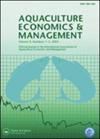Risk preference, risk perception, and purchase recovery period: Empirical evidence from salmon contamination of COVID-19 in China
IF 3.7
2区 经济学
Q1 AGRICULTURAL ECONOMICS & POLICY
引用次数: 2
Abstract
Abstract This paper investigates the recovery period of consumer salmon purchase intention after food scares at the Xinfadi wholesale market in China during the COVID-19 pandemic and examines the impact mechanism of risk preference and risk perception on the period duration. Our empirical analysis is based on a survey of 655 salmon consumers in Beijing, Tianjin, and Shanghai. We estimate that the purchase intention recovery period lasts 21 weeks among the surveyed consumers after the shock. Although the epidemic risk levels of the three cities are different, there is a significant difference only in the recovery period from 5 to 7th weeks. The Cox proportional hazards model results further show that consumers with less risk-averse are more active in resuming purchase intention, and the effect of risk perception is just the opposite. Moreover, risk perception has a moderating effect on risk preference and recovery period. Finally, we put forward three possible policy implications: attaching nucleic acid detection certificate, strengthening cold chain management, and diversifying cooking methods.风险偏好、风险认知和购买恢复期:来自中国新冠肺炎三文鱼污染的经验证据
摘要本文调查了新冠肺炎疫情期间中国新发地批发市场食品恐慌后消费者三文鱼购买意愿的恢复期,并探讨了风险偏好和风险感知对恢复期的影响机制。我们的实证分析基于对北京、天津和上海655名三文鱼消费者的调查。我们估计购买意向恢复期为21 受调查的消费者在冲击后数周。尽管三个城市的疫情风险水平不同,但仅在5至7周的恢复期内存在显著差异。Cox比例风险模型的结果进一步表明,风险厌恶程度较低的消费者更积极地恢复购买意愿,而风险感知的效果恰恰相反。此外,风险感知对风险偏好和恢复期具有调节作用。最后,我们提出了三个可能的政策含义:附加核酸检测证书、加强冷链管理、多样化烹饪方法。
本文章由计算机程序翻译,如有差异,请以英文原文为准。
求助全文
约1分钟内获得全文
求助全文
来源期刊

Aquaculture Economics & Management
FISHERIES-
CiteScore
7.30
自引率
17.90%
发文量
21
期刊介绍:
Aquaculture Economics and Management is a peer-reviewed, international journal which aims to encourage the application of economic analysis to the management, modeling, and planning of aquaculture in public and private sectors. The journal publishes original, high quality papers related to all aspects of aquaculture economics and management including aquaculture production and farm management, innovation and technology adoption, processing and distribution, marketing, consumer behavior and pricing, international trade, policy analysis, and the role of aquaculture in food security, livelihoods, and environmental management. Papers are peer reviewed and evaluated for their scientific merits and contributions.
 求助内容:
求助内容: 应助结果提醒方式:
应助结果提醒方式:


